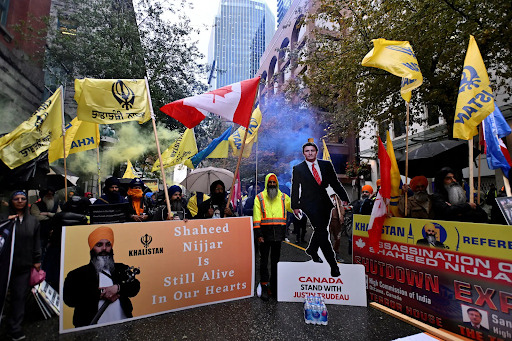
Protesters from the Sikh community outside the Indian consulate in Vancouver in September. Jennifer Gauthier/Reuters
Three individuals face charges in connection with the killing of a Sikh leader in British Columbia, which stirred diplomatic tensions between Canada and India. Hardeep Singh Nijjar, a Sikh nationalist and Canadian citizen, was fatally shot by two masked attackers last June in the parking lot of the temple in Surrey, British Columbia, where he served as president, as per police reports. The three suspects, all Indian nationals in their twenties, were apprehended in Edmonton, Alberta, and charged with first-degree murder and conspiracy to commit murder.
Nijjar was a prominent figure in the local Khalistan movement, advocating for the creation of a separate Sikh nation in India, encompassing the state of Punjab. Born in Punjab himself, Nijjar relocated to Canada during India's crackdown on Sikh leaders in the 1990s. He served as the leader of the Guru Nanak Sikh Gurdwara temple in Surrey, a city with a significant Sikh population outside Vancouver.
The Indian government designated Nijjar as a terrorist in 2020 and called for his arrest. His assassination triggered a diplomatic spat between Canada and India after Prime Minister Justin Trudeau accused India of involvement in the killing on Canadian soil. India vehemently denied the allegation, resulting in the expulsion of senior diplomats from both countries.
Prior to his death, Nijjar had received warnings from the Royal Canadian Mounted Police about threats to his life. Jagmeet Singh, leader of Canada's New Democratic Party and a representative for a British Columbia district, testified at a foreign interference inquiry last month, revealing that he too had been alerted by police about potential threats against him.
The public inquiry, which issued its interim report on Friday, was established in September following mounting pressure on Trudeau to investigate claims of foreign interference in Canadian elections. The report concluded that Indian intelligence operatives utilized proxies in Canada to influence communities and politicians, with a particular focus on the Khalistan movement.
The arrest of the suspects involved in Nijjar's murder may offer some solace to the Sikh community. However, Balpreet Singh Boparai, a Toronto-based lawyer at the World Sikh Organization of Canada, expressed concern that holding only the perpetrators accountable would not suffice. Boparai urged Canada to identify and hold accountable any individuals implicated in the killing and other interference activities.
Despite ongoing investigations, authorities have divulged limited information about progress in Nijjar's murder case. While sources indicated impending arrests in December, the lack of updates has left some in the community anxious as the anniversary of Nijjar's death approaches in June.















